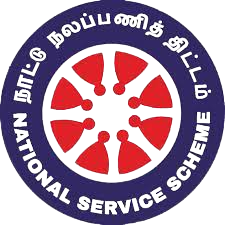National Service Scheme (NSS)
- Home
- NSS
NSS
Introduction
National Service Scheme (NSS) was launched during 1969, the birth centenary year of Mahatma Gandhi, in 37 universities involving 40000 students. NSS is an extension dimension to the higher education system to orient the student youth to community service while they are studying in educational institutions. It is being implemented by the Ministry of Youth Affairs and Sports, Government of India.

The NSS symbol is based on the "Rath" wheel of the Konark Sun Temple situated in Odisha. The navy blue colour indicates the cosmos of which the NSS is a tiny part, ready to contribute its share for the welfare of the mankind. The Red colour in the badge indicates that the NSS volunteers are full of blood i.e. lively, active, energetic and full of high spirit. The giant wheels of the Sun Temple portray the cycle of creation, preservation and release, and signify the movement in life across time and space.
Motto of NSS
The motto or watchword of the National Service Scheme is "NOT ME BUT YOU".
Events
Programme Officer
| # | Unit | Programme Officer |
|---|---|---|
| 1. | I | Mrs. T.Deepa |
| 2. | II | Mr.K.Babu |
| 3. | III | Dr.C.Manivel |
| 4. | IV | Dr.K.Senthi Kumar |
| 5. | V | Dr. C.Jayanthi |
Activities
There are two types of activitiesAll the NSS Volunteers who have served NSS for at least 2 years and have performed 240 hours of work under NSS are entitled to a certificate from the University under the signature of the Vice-Chancellor and the NSS Programme Coordinator.
Special Camps are held annually funded by the Government of India and are usually located in a rural village. Volunteers may be involved in such activities as
